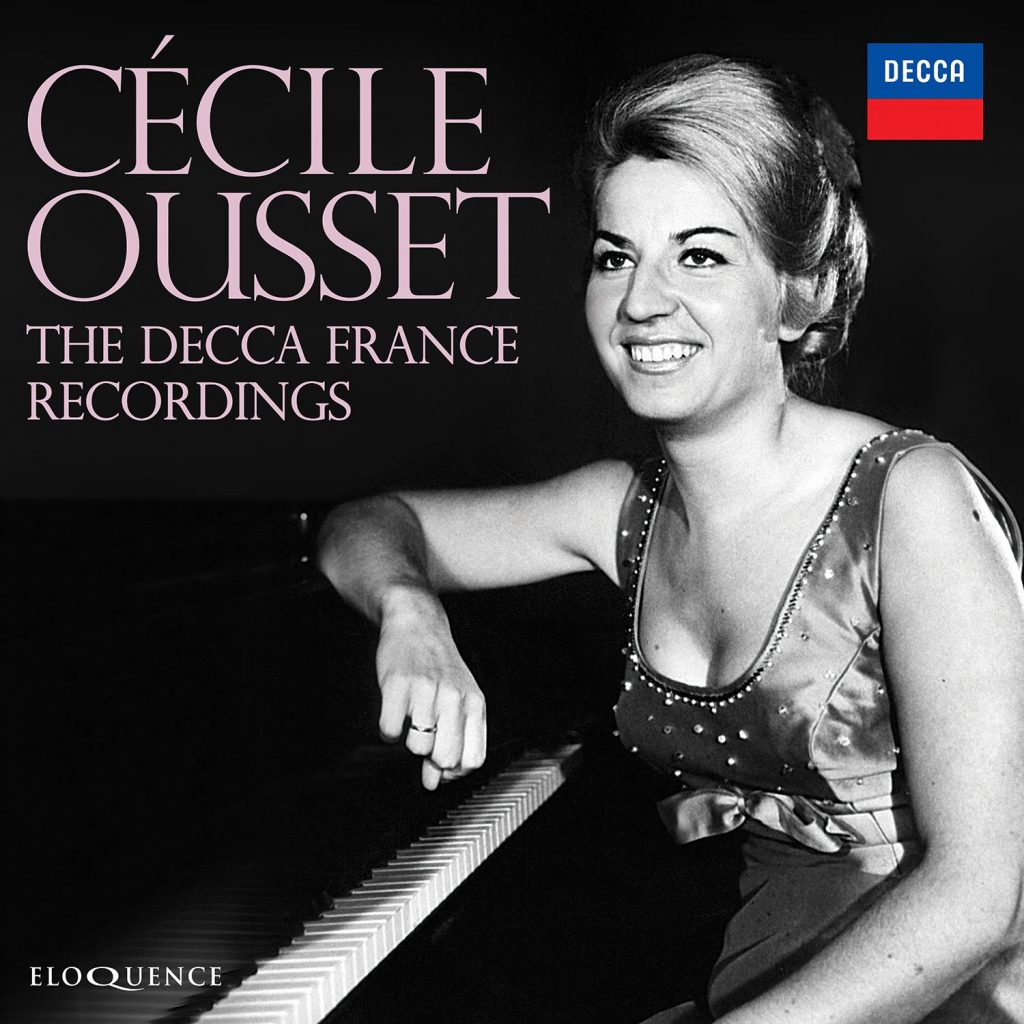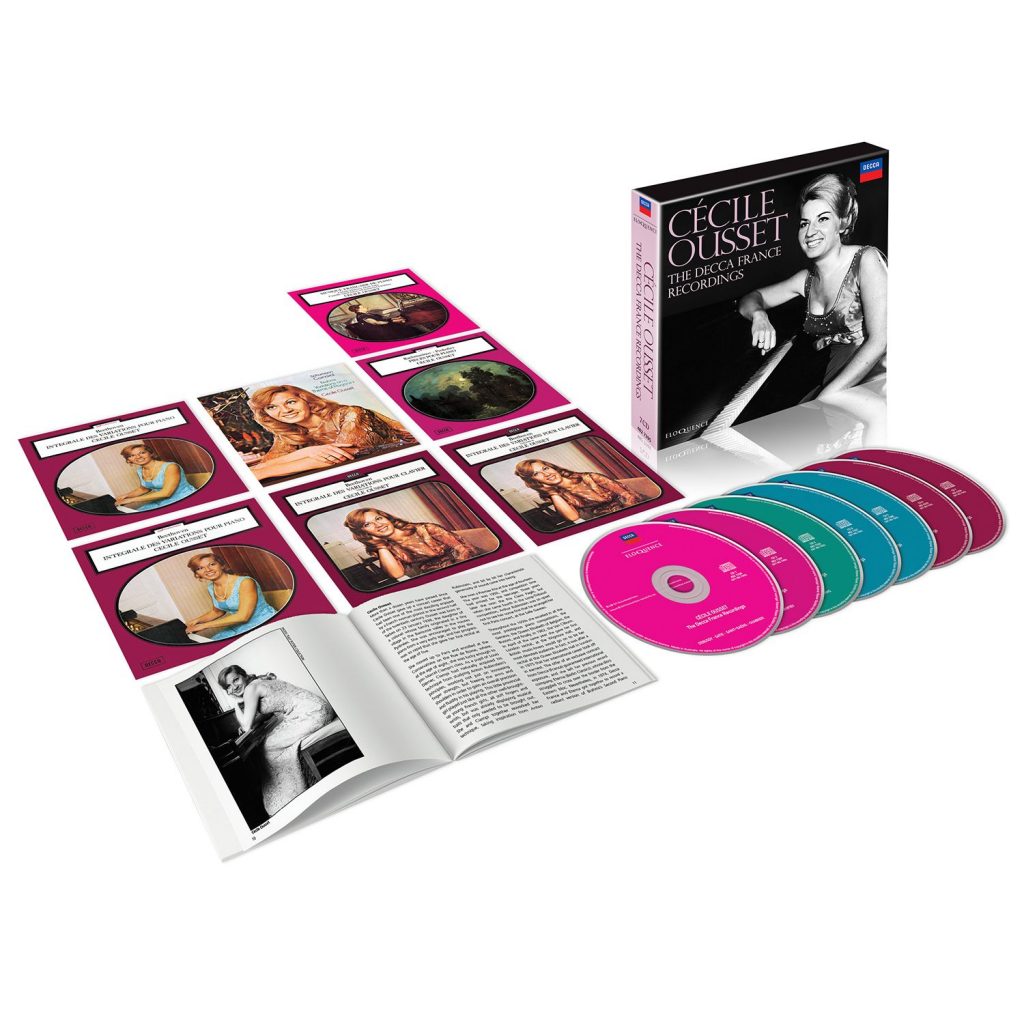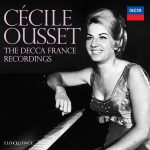The early recordings of a keyboard lioness, long unavailable and new to CD.
Not generally given to extravagant effusions, William Glock (Controller of Radio 3 and the BBC Proms in the 1970s) had no doubt: ‘There is no one who plays the piano better in the world than she does. There is no one with a more fantastic command of the piano … not over felt, not under-felt, nothing rushed just to show off and yet the greatest playing I’ve heard for years’.
He was referring to the French pianist Cécile Ousset, whose career had belatedly sparked to life and international recognition with appearances across the UK and US and a new contract with EMI Records. Yet prior to this Ousset had made several recordings since her success in the late 1950s at several major European competitions. She accumulated a considerable catalogue on Eterna, the East German label, but then Ousset signed to make recordings with Sofrason, the Société Française du Son. These were licensed for wider release by the French arm of Decca, but Sofrason went out of business in 1981 and the recordings have never been reissued – until now. This new Eloquence set includes an appreciation of Ousset’s art by the French pianophile Jean-Charles Hoffélé.
These ‘French Decca’ recordings all date from 1971–76, and they include much solo repertoire that Ousset never recorded again, though they share similar qualities with the much-acclaimed concerto recordings that she made in the 1980s: an unsentimental palette of rubato and tone-colour, a fearless and brilliant command of articulation, and a uniquely French mastery of jeu perlé.
The first album made an imaginative and attractive compilation of fin-de-siècle Parisians from Saint-Saëns to Satie. The second displayed her particular affinity with the Russian post-Romantics, Rachmaninov and Prokofiev; and the third coupled two landmarks of German-Romantic piano literature, by Brahms and Schumann. These all received a later international LP issue on the ‘Ace of Diamonds’ imprint and to very warm reviews.
However, Ousset’s last recordings from this period encompassed the complete variations of Beethoven, issued by French Decca in two volumes (a 3LP and a 2LP box). Its disappearance particularly dismayed Ousset herself: ‘I made a big effort on that one,’ she remarked in a 1984 interview, ‘and it came off beautifully’.
CD 1
CLAUDE DEBUSSY (1862–1918)
Douze Études pour le piano
1 Book II, No. 7: Pour les degrés chromatiques
2 Book II, No. 11: Pour les arpèges composés
3 Book I, No. 3: Pour les quartes
4 Book I, No. 5: Pour les octaves
ERIK SATIE (1866–1925)
5–7 Trois Gymnopédies
CAMILLE SAINT-SAËNS (1835–1921)
8 Étude en forme de valse, Op. 62 No. 5
9 Toccata: Étude d’apres le 5ème concerto, Op. 111 No. 6
EMMANUEL CHABRIER (1841–1894)
Pièces pittoresques
10 No. 6 Idylle
11 No. 7 Scherzo-valse (Danse villageoise)
12 Bourrée fantasque
CD 2
SERGEI RACHMANINOV (1873–1943)
1–5 Morceaux de fantaisie, Op. 3
6 Humoresque, Op. 10 No. 5
SERGEI PROKOFIEV (1891–1953)
7–16 Ten Pieces for piano, Op. 12
CD 3
ROBERT SCHUMANN (1810–1856)
1–21 Carnaval, Op. 9
JOHANNES BRAHMS (1833–1897)
Variations on a theme of Paganini, Op. 35
22 Book I
23 Book II
CD 4
LUDWIG VAN BEETHOVEN (1770–1827)
1 9 Variations on a march by Ernst Christoph Dressler, WoO 63
2 6 Variations on a Swiss song, WoO 64
3 9 Variations on ‘Quant’e piu bello’ from Giovanni Paisiello’s opera La Molinara, WoO 69
4 24 Variations on Vincenzo Righini’s aria ‘Venni Amore’, WoO 65 5 6 Variations on ‘Nel cor più non mi sento’ from Giovanni Paisiello’s opera La Molinara, WoO 70
6 13 Variations on the aria ‘Es war einmal ein alter Mann’ from Carl Ditters von Dittersdorf’s opera Das rote Käppchen, WoO 66
7 12 Variations on the ‘Menuet a la Vigano’ from Jakob Haibel‘s ballet La nozza disturbate, WoO 68
CD 5
LUDWIG VAN BEETHOVEN (1770–1827)
1 8 Variations on ‘Une fièvre brûlante’ from André Grétry’s opera Richard Coeur-de-lion, WoO 72
2 6 Easy Variations on an original theme for piano, WoO 77
3 6 Variations on a theme in F major, Op. 34
4 7 Variations for piano on ‘God Save the King’, WoO 78
5 7 Variations on ‘Kind, willst du ruhig schlafen’ from Peter Winter’s opera Das unterbrochene Opferfest, WoO 75
6 5 Variations on ‘Rule, Britannia!’, WoO 79
7 8 Variations on ‘Tändeln und scherzen’ from Franz Xaver Süssmayr’s opera Soliman II, WoO 76
8 6 Variations on an original theme (the Turkish March from The Ruins of Athens) in D major, Op. 76
CD 6
LUDWIG VAN BEETHOVEN (1770–1827)
1 32 Variations on an original theme in C minor, WoO 80
2 12 Variations on the Russian dance from Paul Wranitzky’s ballet Das Waldmädchen, WoO 71
3 10 Variations on ‘La stessa, la stessissima’ from Antonio Salieri’s opera Falstaff, WoO 73
4–22 15 Variations and Fugue in E flat major on an original theme, Op. 35 (‘Eroica Variations’)
CD 7
LUDWIG VAN BEETHOVEN (1770–1827)
1–34 33 Variations in C major on a Waltz by Diabelli, Op. 120
CÉCILE OUSSET, piano
CD 1
Recordings: France, 1971
First issued on Decca (France) 7.159 in 1971
CD 2
Recordings: France, 1973
First issued on Decca (France) 7.208 in 1974
CD 3
Recordings: France, 1973
First issued on Decca (France) 7.197 in 1974
CD 4 – CD 6
Recordings: 1975–76
First issued on Decca (France) 7439/41 (3LP set) in 1976
P & C 1976 Decca Records France
CD 7
Recordings: 1975–76
First issued on Decca (France) 7474/75 (2LP set) in 1977
‘Ousset has exactly the sort of glitteringly virtuosic technique, as well as the unflagging energy, which [these pieces] demand. Her playing is vividly recorded, giving an effect of real immediacy.’ Gramophone, January 1980 (French recital)
‘Ousset’s performance is vital and assured, grandly shaped where grandeur is in place, capable of brilliance and a certain cool aggression, tonally apt. In eschewing unnecessary colouring she never starves the music of tone.’ Gramophone, August 1975 (Brahms/Schumann)




